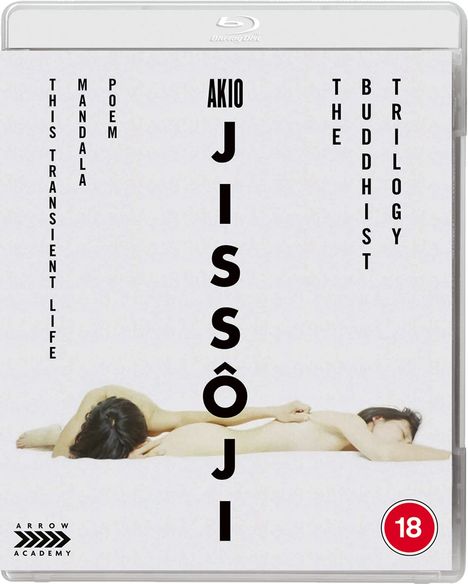Akio Jissoji: The Buddhist Trilogy (Blu-ray) (UK Import)
Akio Jissoji: The Buddhist Trilogy (Blu-ray) (UK Import)
3
Blu-ray Discs
Blu-Ray Disc
Die Blu-Ray wurde als High-Definition-Nachfolger der DVD entwickelt und bietet ihrem Vorläufer gegenüber eine erheblich gesteigerte Datenrate und Speicherkapazität. Auf Blu-Rays können daher Filme mit deutlich besserer Auflösung gespeichert werden und bieten auf entsprechenden Bildschirmen eine enorm hohe Bildqualität. Blu-Ray-Player sind in der Regel abwärtskompatibel zu DVDs, so dass auch diese abgespielt werden können.
lieferbar innerhalb einer Woche
(soweit verfügbar beim Lieferanten)
(soweit verfügbar beim Lieferanten)
EUR 31,99*
Verlängerter Rückgabezeitraum bis 31. Januar 2025
Alle zur Rückgabe berechtigten Produkte, die zwischen dem 1. bis 31. Dezember 2024 gekauft wurden, können bis zum 31. Januar 2025 zurückgegeben werden.
- Japan, 1970-1972
-
Dieser Titel ist nicht FSK-geprüft.
Eine Lieferung an Minderjährige ist nicht möglich.
Infos zu Titeln ohne Jugendfreigabe - Bestellnummer: 10469843
- Erscheinungstermin: 5.4.2021
-
Genre:
Spieldauer: 394 Min. - Regie: Akio Jissoji
- Sprache: Japanisch
- Tonformat: mono
- Untertitel: Englisch
Akio Jissôji created a rich and diverse body of work during his five decades in Japan’s film and television industries. For some, he is best-known for his science-fiction: the 1960s TV series Ultraman and 1998’s box-office success Tokyo: The Last Megalopolis. For others, it is his 1990s adaptations of horror and mystery novelist Edogawa Rampo, such as Watcher in the Attic and Murder on D Street. And then there are his New Wave films for the Art Theatre Guild, three of which – This Transient Life, Mandala and Poem, forming The Buddhist Trilogy – are collected here.
Winner of the Golden Leopard award at the 1970 Locarno Film Festival, This Transient Life is among the Art Theatre Guild’s most successful – and most controversial – productions. The film concerns a brother and sister from a rich family who defy the expectations placed on them: he has little interest in further education or his father’s business, instead obsessing over Buddhist statues; she continually refuses a string of suitors and the prospect of marriage. Their closeness, and isolation, gives way to an incestuous relationship which, in turn, breeds disaster.
Mandara, Jissôji’s first colour feature, maintained the controversial subject matter, focussing on a cult who recruit through rape and hope to achieve true ecstasy through sexual release. Shot, as with all of Jissôji’s Art Theatre Guild works, in a radically stylised manner, the film sits somewhere between the pinku genre and the fiercely experimental approach of his Japanese New Wave contemporaries.
The final entry in the trilogy, Poem, returns to black and white and is centred on the austere existence of a young houseboy who becomes helplessly embroiled in the schemes of two brothers. Written by Toshirô Ishidô (screenwriter of Nagisa Ôshima’s The Sun’s Burial and Shôhei Imamura’s Black Rain), who also penned This Transient Life and Mandala, Poem continues the trilogy’s exploration of faith in a post-industrial world.
Winner of the Golden Leopard award at the 1970 Locarno Film Festival, This Transient Life is among the Art Theatre Guild’s most successful – and most controversial – productions. The film concerns a brother and sister from a rich family who defy the expectations placed on them: he has little interest in further education or his father’s business, instead obsessing over Buddhist statues; she continually refuses a string of suitors and the prospect of marriage. Their closeness, and isolation, gives way to an incestuous relationship which, in turn, breeds disaster.
Mandara, Jissôji’s first colour feature, maintained the controversial subject matter, focussing on a cult who recruit through rape and hope to achieve true ecstasy through sexual release. Shot, as with all of Jissôji’s Art Theatre Guild works, in a radically stylised manner, the film sits somewhere between the pinku genre and the fiercely experimental approach of his Japanese New Wave contemporaries.
The final entry in the trilogy, Poem, returns to black and white and is centred on the austere existence of a young houseboy who becomes helplessly embroiled in the schemes of two brothers. Written by Toshirô Ishidô (screenwriter of Nagisa Ôshima’s The Sun’s Burial and Shôhei Imamura’s Black Rain), who also penned This Transient Life and Mandala, Poem continues the trilogy’s exploration of faith in a post-industrial world.




